Management Report: Sainsbury's Acquisition of Argos - Key Issues
VerifiedAdded on 2023/06/17
|12
|4085
|405
Report
AI Summary
This report provides a comprehensive analysis of the contemporary management issues surrounding Sainsbury's acquisition of Argos. It identifies drivers of change using PESTLE and Porter's Five Forces, examining the role of sustainability through the triple bottom line concept (people, planet, profitability). The report also discusses the ethical considerations and CSR strategies relevant to the takeover, highlighting social changes and their drivers. Ultimately, it offers recommendations for Sainsbury's to effectively integrate Argos and navigate the challenges and opportunities presented by the acquisition, emphasizing the importance of sustainability and ethical business practices to maintain a competitive edge and positive stakeholder relationships. Desklib provides access to similar solved assignments and past papers for students.
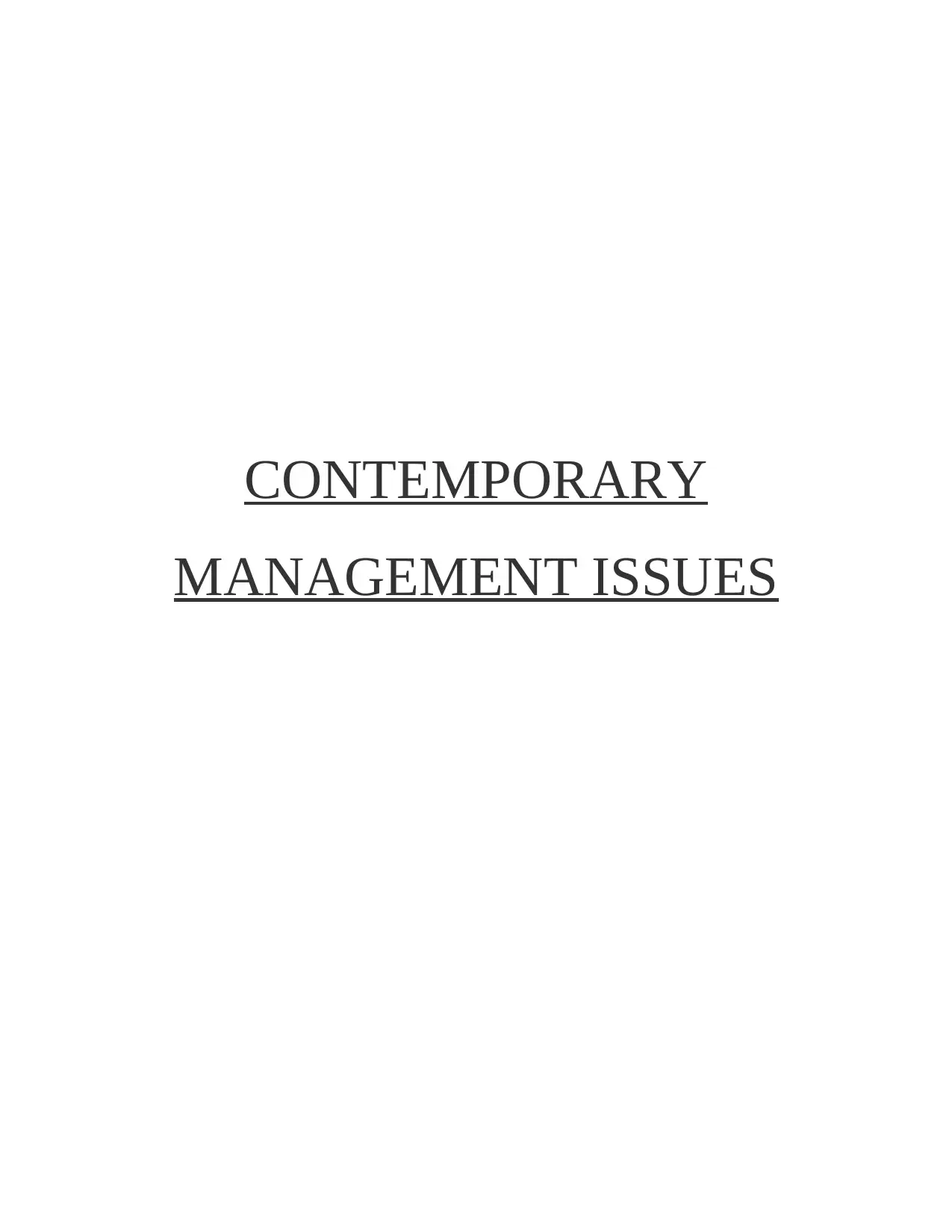
CONTEMPORARY
MANAGEMENT ISSUES
MANAGEMENT ISSUES
Paraphrase This Document
Need a fresh take? Get an instant paraphrase of this document with our AI Paraphraser
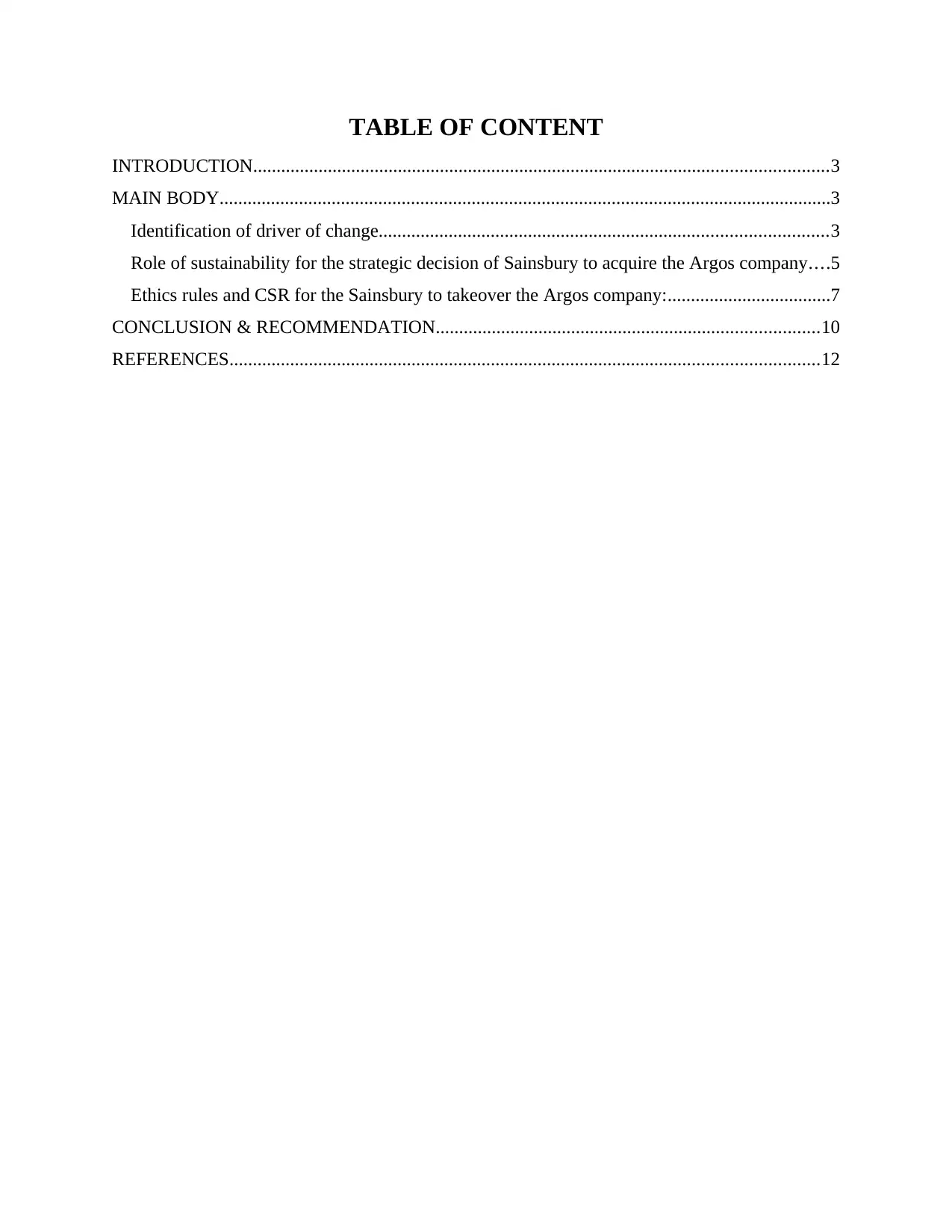
TABLE OF CONTENT
INTRODUCTION...........................................................................................................................3
MAIN BODY...................................................................................................................................3
Identification of driver of change................................................................................................3
Role of sustainability for the strategic decision of Sainsbury to acquire the Argos company....5
Ethics rules and CSR for the Sainsbury to takeover the Argos company:...................................7
CONCLUSION & RECOMMENDATION..................................................................................10
REFERENCES..............................................................................................................................12
INTRODUCTION...........................................................................................................................3
MAIN BODY...................................................................................................................................3
Identification of driver of change................................................................................................3
Role of sustainability for the strategic decision of Sainsbury to acquire the Argos company....5
Ethics rules and CSR for the Sainsbury to takeover the Argos company:...................................7
CONCLUSION & RECOMMENDATION..................................................................................10
REFERENCES..............................................................................................................................12
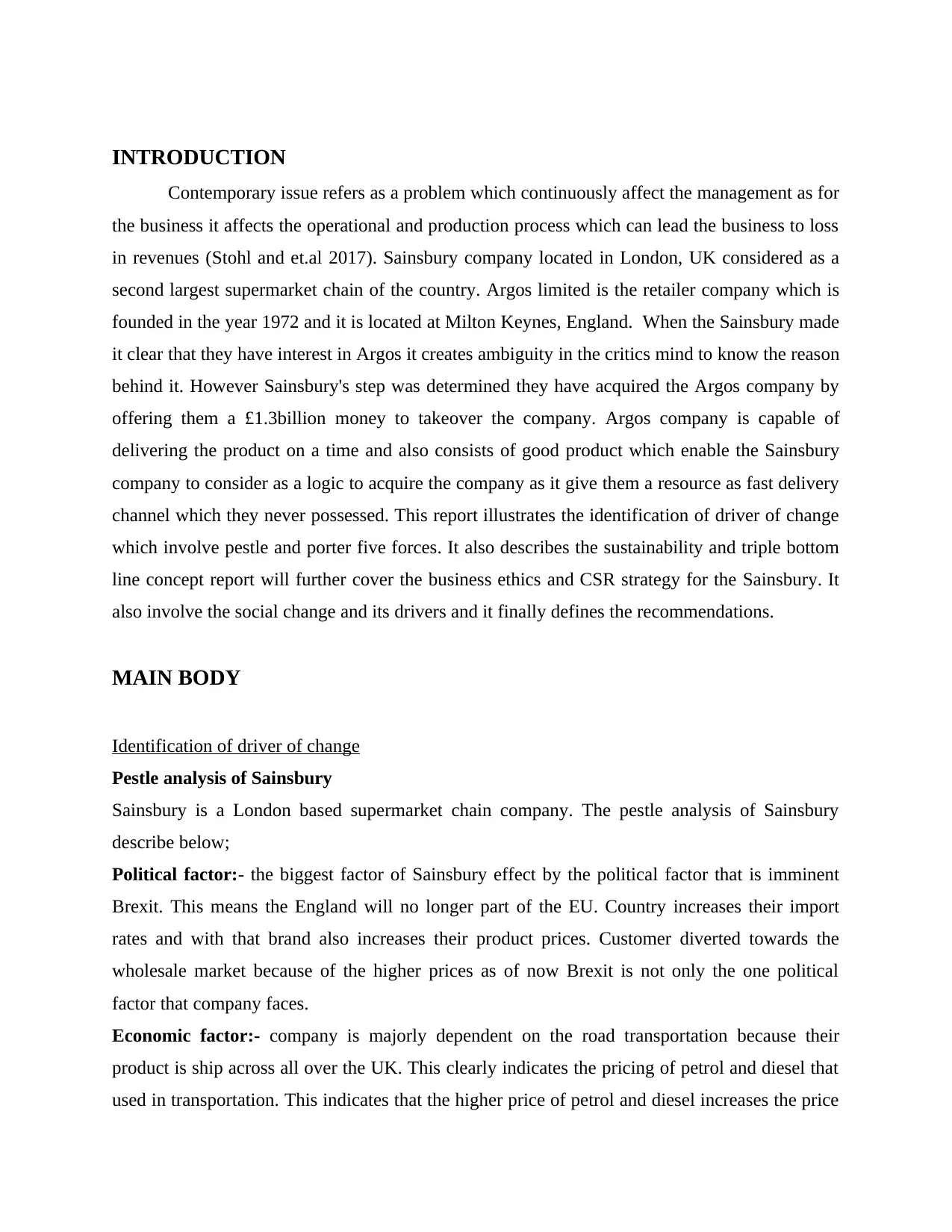
INTRODUCTION
Contemporary issue refers as a problem which continuously affect the management as for
the business it affects the operational and production process which can lead the business to loss
in revenues (Stohl and et.al 2017). Sainsbury company located in London, UK considered as a
second largest supermarket chain of the country. Argos limited is the retailer company which is
founded in the year 1972 and it is located at Milton Keynes, England. When the Sainsbury made
it clear that they have interest in Argos it creates ambiguity in the critics mind to know the reason
behind it. However Sainsbury's step was determined they have acquired the Argos company by
offering them a £1.3billion money to takeover the company. Argos company is capable of
delivering the product on a time and also consists of good product which enable the Sainsbury
company to consider as a logic to acquire the company as it give them a resource as fast delivery
channel which they never possessed. This report illustrates the identification of driver of change
which involve pestle and porter five forces. It also describes the sustainability and triple bottom
line concept report will further cover the business ethics and CSR strategy for the Sainsbury. It
also involve the social change and its drivers and it finally defines the recommendations.
MAIN BODY
Identification of driver of change
Pestle analysis of Sainsbury
Sainsbury is a London based supermarket chain company. The pestle analysis of Sainsbury
describe below;
Political factor:- the biggest factor of Sainsbury effect by the political factor that is imminent
Brexit. This means the England will no longer part of the EU. Country increases their import
rates and with that brand also increases their product prices. Customer diverted towards the
wholesale market because of the higher prices as of now Brexit is not only the one political
factor that company faces.
Economic factor:- company is majorly dependent on the road transportation because their
product is ship across all over the UK. This clearly indicates the pricing of petrol and diesel that
used in transportation. This indicates that the higher price of petrol and diesel increases the price
Contemporary issue refers as a problem which continuously affect the management as for
the business it affects the operational and production process which can lead the business to loss
in revenues (Stohl and et.al 2017). Sainsbury company located in London, UK considered as a
second largest supermarket chain of the country. Argos limited is the retailer company which is
founded in the year 1972 and it is located at Milton Keynes, England. When the Sainsbury made
it clear that they have interest in Argos it creates ambiguity in the critics mind to know the reason
behind it. However Sainsbury's step was determined they have acquired the Argos company by
offering them a £1.3billion money to takeover the company. Argos company is capable of
delivering the product on a time and also consists of good product which enable the Sainsbury
company to consider as a logic to acquire the company as it give them a resource as fast delivery
channel which they never possessed. This report illustrates the identification of driver of change
which involve pestle and porter five forces. It also describes the sustainability and triple bottom
line concept report will further cover the business ethics and CSR strategy for the Sainsbury. It
also involve the social change and its drivers and it finally defines the recommendations.
MAIN BODY
Identification of driver of change
Pestle analysis of Sainsbury
Sainsbury is a London based supermarket chain company. The pestle analysis of Sainsbury
describe below;
Political factor:- the biggest factor of Sainsbury effect by the political factor that is imminent
Brexit. This means the England will no longer part of the EU. Country increases their import
rates and with that brand also increases their product prices. Customer diverted towards the
wholesale market because of the higher prices as of now Brexit is not only the one political
factor that company faces.
Economic factor:- company is majorly dependent on the road transportation because their
product is ship across all over the UK. This clearly indicates the pricing of petrol and diesel that
used in transportation. This indicates that the higher price of petrol and diesel increases the price
⊘ This is a preview!⊘
Do you want full access?
Subscribe today to unlock all pages.

Trusted by 1+ million students worldwide
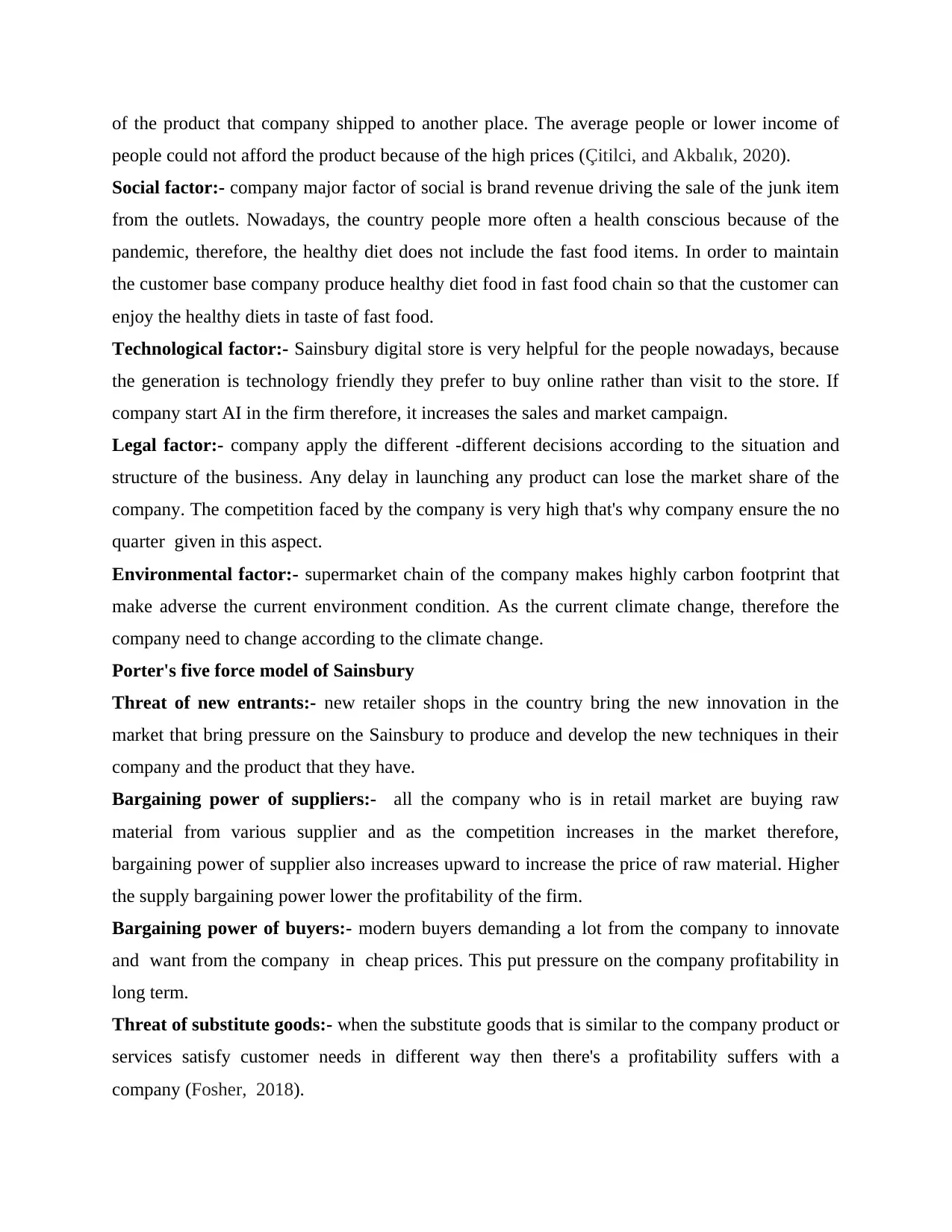
of the product that company shipped to another place. The average people or lower income of
people could not afford the product because of the high prices (Çitilci, and Akbalık, 2020).
Social factor:- company major factor of social is brand revenue driving the sale of the junk item
from the outlets. Nowadays, the country people more often a health conscious because of the
pandemic, therefore, the healthy diet does not include the fast food items. In order to maintain
the customer base company produce healthy diet food in fast food chain so that the customer can
enjoy the healthy diets in taste of fast food.
Technological factor:- Sainsbury digital store is very helpful for the people nowadays, because
the generation is technology friendly they prefer to buy online rather than visit to the store. If
company start AI in the firm therefore, it increases the sales and market campaign.
Legal factor:- company apply the different -different decisions according to the situation and
structure of the business. Any delay in launching any product can lose the market share of the
company. The competition faced by the company is very high that's why company ensure the no
quarter given in this aspect.
Environmental factor:- supermarket chain of the company makes highly carbon footprint that
make adverse the current environment condition. As the current climate change, therefore the
company need to change according to the climate change.
Porter's five force model of Sainsbury
Threat of new entrants:- new retailer shops in the country bring the new innovation in the
market that bring pressure on the Sainsbury to produce and develop the new techniques in their
company and the product that they have.
Bargaining power of suppliers:- all the company who is in retail market are buying raw
material from various supplier and as the competition increases in the market therefore,
bargaining power of supplier also increases upward to increase the price of raw material. Higher
the supply bargaining power lower the profitability of the firm.
Bargaining power of buyers:- modern buyers demanding a lot from the company to innovate
and want from the company in cheap prices. This put pressure on the company profitability in
long term.
Threat of substitute goods:- when the substitute goods that is similar to the company product or
services satisfy customer needs in different way then there's a profitability suffers with a
company (Fosher, 2018).
people could not afford the product because of the high prices (Çitilci, and Akbalık, 2020).
Social factor:- company major factor of social is brand revenue driving the sale of the junk item
from the outlets. Nowadays, the country people more often a health conscious because of the
pandemic, therefore, the healthy diet does not include the fast food items. In order to maintain
the customer base company produce healthy diet food in fast food chain so that the customer can
enjoy the healthy diets in taste of fast food.
Technological factor:- Sainsbury digital store is very helpful for the people nowadays, because
the generation is technology friendly they prefer to buy online rather than visit to the store. If
company start AI in the firm therefore, it increases the sales and market campaign.
Legal factor:- company apply the different -different decisions according to the situation and
structure of the business. Any delay in launching any product can lose the market share of the
company. The competition faced by the company is very high that's why company ensure the no
quarter given in this aspect.
Environmental factor:- supermarket chain of the company makes highly carbon footprint that
make adverse the current environment condition. As the current climate change, therefore the
company need to change according to the climate change.
Porter's five force model of Sainsbury
Threat of new entrants:- new retailer shops in the country bring the new innovation in the
market that bring pressure on the Sainsbury to produce and develop the new techniques in their
company and the product that they have.
Bargaining power of suppliers:- all the company who is in retail market are buying raw
material from various supplier and as the competition increases in the market therefore,
bargaining power of supplier also increases upward to increase the price of raw material. Higher
the supply bargaining power lower the profitability of the firm.
Bargaining power of buyers:- modern buyers demanding a lot from the company to innovate
and want from the company in cheap prices. This put pressure on the company profitability in
long term.
Threat of substitute goods:- when the substitute goods that is similar to the company product or
services satisfy customer needs in different way then there's a profitability suffers with a
company (Fosher, 2018).
Paraphrase This Document
Need a fresh take? Get an instant paraphrase of this document with our AI Paraphraser
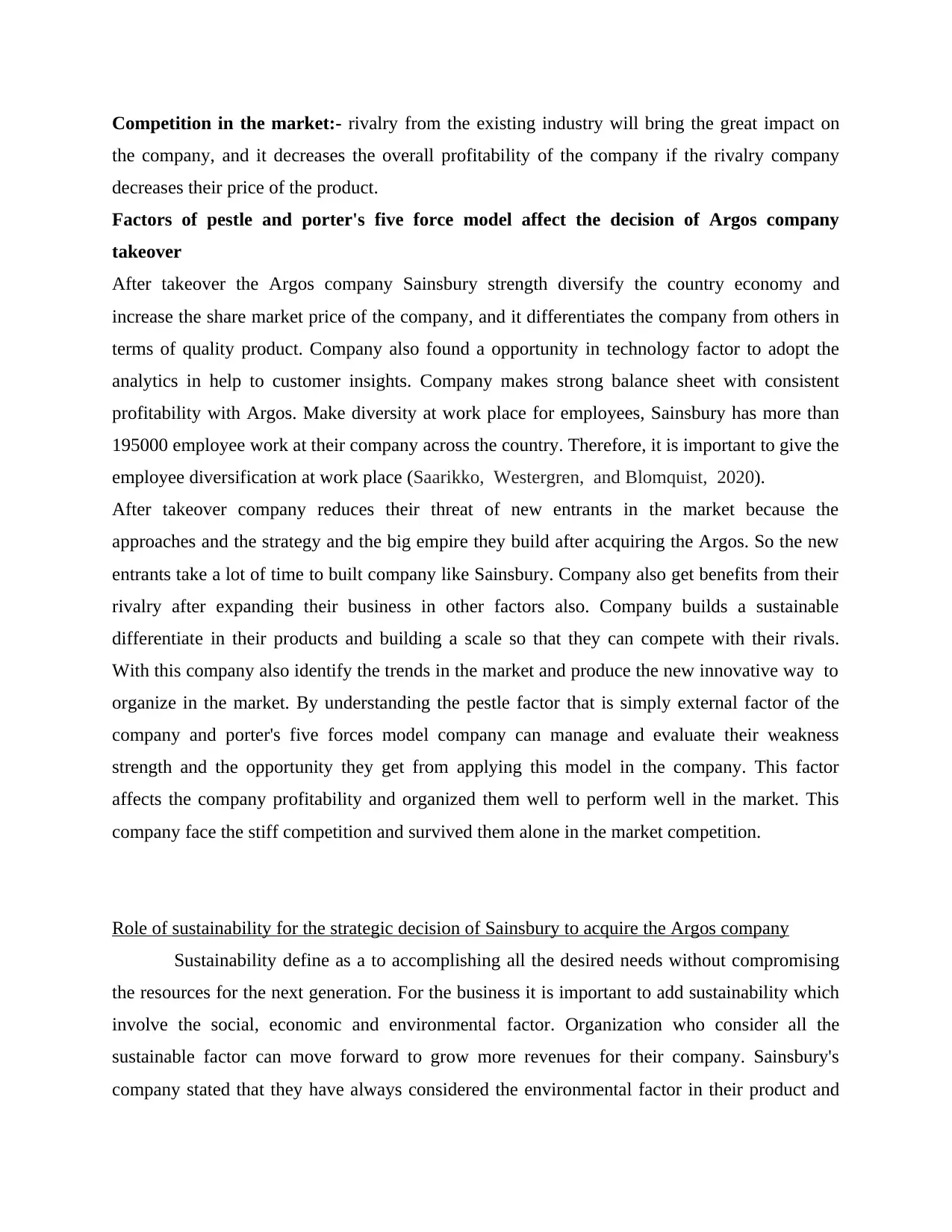
Competition in the market:- rivalry from the existing industry will bring the great impact on
the company, and it decreases the overall profitability of the company if the rivalry company
decreases their price of the product.
Factors of pestle and porter's five force model affect the decision of Argos company
takeover
After takeover the Argos company Sainsbury strength diversify the country economy and
increase the share market price of the company, and it differentiates the company from others in
terms of quality product. Company also found a opportunity in technology factor to adopt the
analytics in help to customer insights. Company makes strong balance sheet with consistent
profitability with Argos. Make diversity at work place for employees, Sainsbury has more than
195000 employee work at their company across the country. Therefore, it is important to give the
employee diversification at work place (Saarikko, Westergren, and Blomquist, 2020).
After takeover company reduces their threat of new entrants in the market because the
approaches and the strategy and the big empire they build after acquiring the Argos. So the new
entrants take a lot of time to built company like Sainsbury. Company also get benefits from their
rivalry after expanding their business in other factors also. Company builds a sustainable
differentiate in their products and building a scale so that they can compete with their rivals.
With this company also identify the trends in the market and produce the new innovative way to
organize in the market. By understanding the pestle factor that is simply external factor of the
company and porter's five forces model company can manage and evaluate their weakness
strength and the opportunity they get from applying this model in the company. This factor
affects the company profitability and organized them well to perform well in the market. This
company face the stiff competition and survived them alone in the market competition.
Role of sustainability for the strategic decision of Sainsbury to acquire the Argos company
Sustainability define as a to accomplishing all the desired needs without compromising
the resources for the next generation. For the business it is important to add sustainability which
involve the social, economic and environmental factor. Organization who consider all the
sustainable factor can move forward to grow more revenues for their company. Sainsbury's
company stated that they have always considered the environmental factor in their product and
the company, and it decreases the overall profitability of the company if the rivalry company
decreases their price of the product.
Factors of pestle and porter's five force model affect the decision of Argos company
takeover
After takeover the Argos company Sainsbury strength diversify the country economy and
increase the share market price of the company, and it differentiates the company from others in
terms of quality product. Company also found a opportunity in technology factor to adopt the
analytics in help to customer insights. Company makes strong balance sheet with consistent
profitability with Argos. Make diversity at work place for employees, Sainsbury has more than
195000 employee work at their company across the country. Therefore, it is important to give the
employee diversification at work place (Saarikko, Westergren, and Blomquist, 2020).
After takeover company reduces their threat of new entrants in the market because the
approaches and the strategy and the big empire they build after acquiring the Argos. So the new
entrants take a lot of time to built company like Sainsbury. Company also get benefits from their
rivalry after expanding their business in other factors also. Company builds a sustainable
differentiate in their products and building a scale so that they can compete with their rivals.
With this company also identify the trends in the market and produce the new innovative way to
organize in the market. By understanding the pestle factor that is simply external factor of the
company and porter's five forces model company can manage and evaluate their weakness
strength and the opportunity they get from applying this model in the company. This factor
affects the company profitability and organized them well to perform well in the market. This
company face the stiff competition and survived them alone in the market competition.
Role of sustainability for the strategic decision of Sainsbury to acquire the Argos company
Sustainability define as a to accomplishing all the desired needs without compromising
the resources for the next generation. For the business it is important to add sustainability which
involve the social, economic and environmental factor. Organization who consider all the
sustainable factor can move forward to grow more revenues for their company. Sainsbury's
company stated that they have always considered the environmental factor in their product and
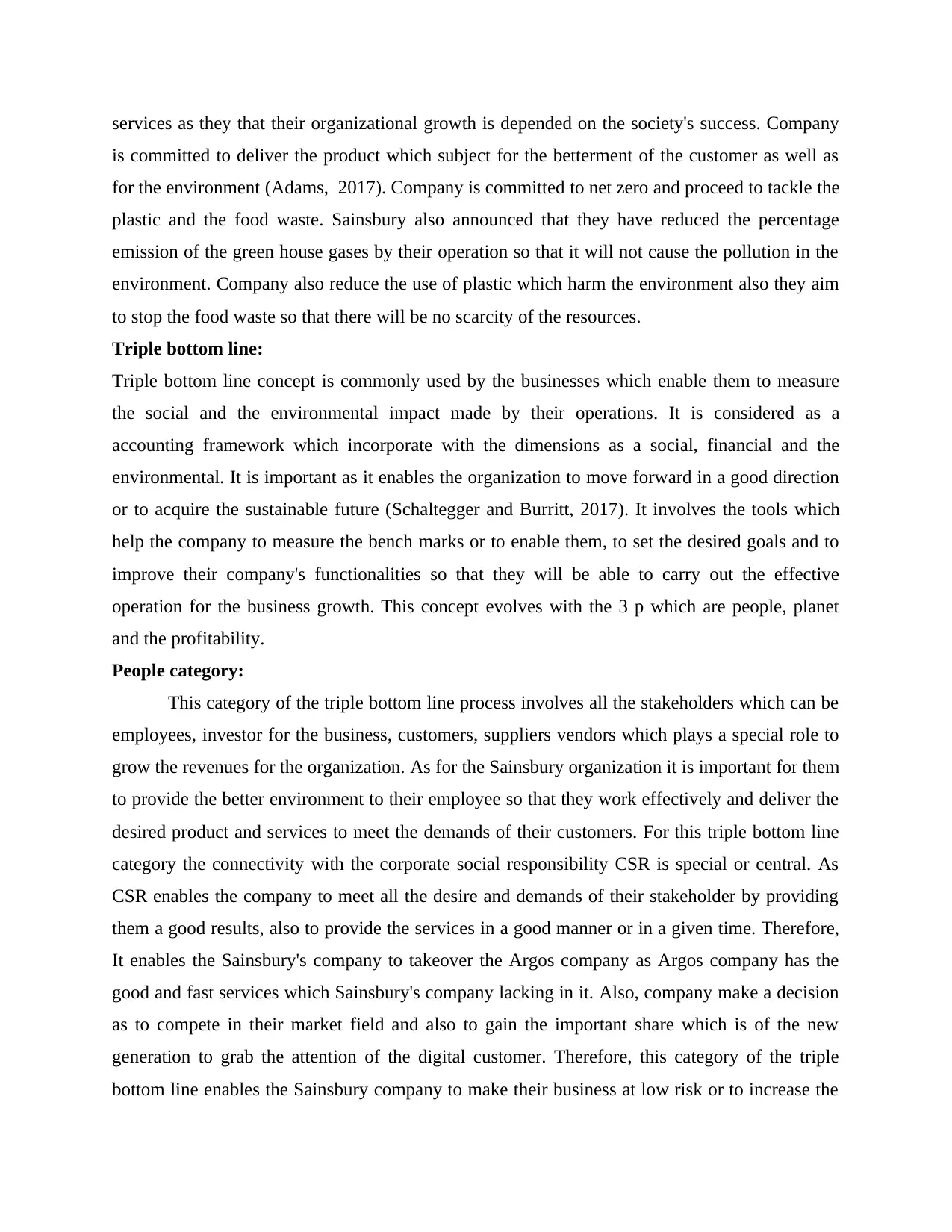
services as they that their organizational growth is depended on the society's success. Company
is committed to deliver the product which subject for the betterment of the customer as well as
for the environment (Adams, 2017). Company is committed to net zero and proceed to tackle the
plastic and the food waste. Sainsbury also announced that they have reduced the percentage
emission of the green house gases by their operation so that it will not cause the pollution in the
environment. Company also reduce the use of plastic which harm the environment also they aim
to stop the food waste so that there will be no scarcity of the resources.
Triple bottom line:
Triple bottom line concept is commonly used by the businesses which enable them to measure
the social and the environmental impact made by their operations. It is considered as a
accounting framework which incorporate with the dimensions as a social, financial and the
environmental. It is important as it enables the organization to move forward in a good direction
or to acquire the sustainable future (Schaltegger and Burritt, 2017). It involves the tools which
help the company to measure the bench marks or to enable them, to set the desired goals and to
improve their company's functionalities so that they will be able to carry out the effective
operation for the business growth. This concept evolves with the 3 p which are people, planet
and the profitability.
People category:
This category of the triple bottom line process involves all the stakeholders which can be
employees, investor for the business, customers, suppliers vendors which plays a special role to
grow the revenues for the organization. As for the Sainsbury organization it is important for them
to provide the better environment to their employee so that they work effectively and deliver the
desired product and services to meet the demands of their customers. For this triple bottom line
category the connectivity with the corporate social responsibility CSR is special or central. As
CSR enables the company to meet all the desire and demands of their stakeholder by providing
them a good results, also to provide the services in a good manner or in a given time. Therefore,
It enables the Sainsbury's company to takeover the Argos company as Argos company has the
good and fast services which Sainsbury's company lacking in it. Also, company make a decision
as to compete in their market field and also to gain the important share which is of the new
generation to grab the attention of the digital customer. Therefore, this category of the triple
bottom line enables the Sainsbury company to make their business at low risk or to increase the
is committed to deliver the product which subject for the betterment of the customer as well as
for the environment (Adams, 2017). Company is committed to net zero and proceed to tackle the
plastic and the food waste. Sainsbury also announced that they have reduced the percentage
emission of the green house gases by their operation so that it will not cause the pollution in the
environment. Company also reduce the use of plastic which harm the environment also they aim
to stop the food waste so that there will be no scarcity of the resources.
Triple bottom line:
Triple bottom line concept is commonly used by the businesses which enable them to measure
the social and the environmental impact made by their operations. It is considered as a
accounting framework which incorporate with the dimensions as a social, financial and the
environmental. It is important as it enables the organization to move forward in a good direction
or to acquire the sustainable future (Schaltegger and Burritt, 2017). It involves the tools which
help the company to measure the bench marks or to enable them, to set the desired goals and to
improve their company's functionalities so that they will be able to carry out the effective
operation for the business growth. This concept evolves with the 3 p which are people, planet
and the profitability.
People category:
This category of the triple bottom line process involves all the stakeholders which can be
employees, investor for the business, customers, suppliers vendors which plays a special role to
grow the revenues for the organization. As for the Sainsbury organization it is important for them
to provide the better environment to their employee so that they work effectively and deliver the
desired product and services to meet the demands of their customers. For this triple bottom line
category the connectivity with the corporate social responsibility CSR is special or central. As
CSR enables the company to meet all the desire and demands of their stakeholder by providing
them a good results, also to provide the services in a good manner or in a given time. Therefore,
It enables the Sainsbury's company to takeover the Argos company as Argos company has the
good and fast services which Sainsbury's company lacking in it. Also, company make a decision
as to compete in their market field and also to gain the important share which is of the new
generation to grab the attention of the digital customer. Therefore, this category of the triple
bottom line enables the Sainsbury company to make their business at low risk or to increase the
⊘ This is a preview!⊘
Do you want full access?
Subscribe today to unlock all pages.

Trusted by 1+ million students worldwide
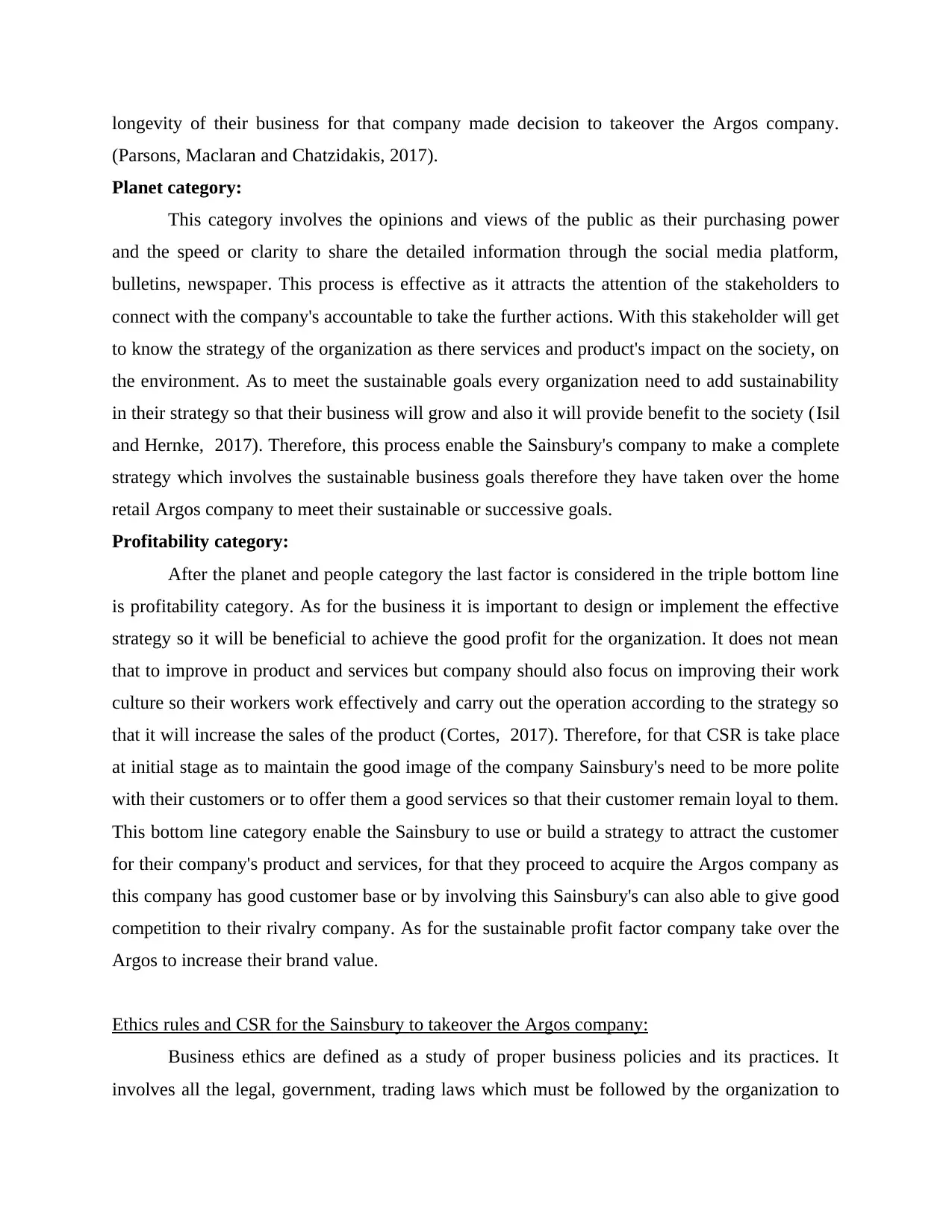
longevity of their business for that company made decision to takeover the Argos company.
(Parsons, Maclaran and Chatzidakis, 2017).
Planet category:
This category involves the opinions and views of the public as their purchasing power
and the speed or clarity to share the detailed information through the social media platform,
bulletins, newspaper. This process is effective as it attracts the attention of the stakeholders to
connect with the company's accountable to take the further actions. With this stakeholder will get
to know the strategy of the organization as there services and product's impact on the society, on
the environment. As to meet the sustainable goals every organization need to add sustainability
in their strategy so that their business will grow and also it will provide benefit to the society (Isil
and Hernke, 2017). Therefore, this process enable the Sainsbury's company to make a complete
strategy which involves the sustainable business goals therefore they have taken over the home
retail Argos company to meet their sustainable or successive goals.
Profitability category:
After the planet and people category the last factor is considered in the triple bottom line
is profitability category. As for the business it is important to design or implement the effective
strategy so it will be beneficial to achieve the good profit for the organization. It does not mean
that to improve in product and services but company should also focus on improving their work
culture so their workers work effectively and carry out the operation according to the strategy so
that it will increase the sales of the product (Cortes, 2017). Therefore, for that CSR is take place
at initial stage as to maintain the good image of the company Sainsbury's need to be more polite
with their customers or to offer them a good services so that their customer remain loyal to them.
This bottom line category enable the Sainsbury to use or build a strategy to attract the customer
for their company's product and services, for that they proceed to acquire the Argos company as
this company has good customer base or by involving this Sainsbury's can also able to give good
competition to their rivalry company. As for the sustainable profit factor company take over the
Argos to increase their brand value.
Ethics rules and CSR for the Sainsbury to takeover the Argos company:
Business ethics are defined as a study of proper business policies and its practices. It
involves all the legal, government, trading laws which must be followed by the organization to
(Parsons, Maclaran and Chatzidakis, 2017).
Planet category:
This category involves the opinions and views of the public as their purchasing power
and the speed or clarity to share the detailed information through the social media platform,
bulletins, newspaper. This process is effective as it attracts the attention of the stakeholders to
connect with the company's accountable to take the further actions. With this stakeholder will get
to know the strategy of the organization as there services and product's impact on the society, on
the environment. As to meet the sustainable goals every organization need to add sustainability
in their strategy so that their business will grow and also it will provide benefit to the society (Isil
and Hernke, 2017). Therefore, this process enable the Sainsbury's company to make a complete
strategy which involves the sustainable business goals therefore they have taken over the home
retail Argos company to meet their sustainable or successive goals.
Profitability category:
After the planet and people category the last factor is considered in the triple bottom line
is profitability category. As for the business it is important to design or implement the effective
strategy so it will be beneficial to achieve the good profit for the organization. It does not mean
that to improve in product and services but company should also focus on improving their work
culture so their workers work effectively and carry out the operation according to the strategy so
that it will increase the sales of the product (Cortes, 2017). Therefore, for that CSR is take place
at initial stage as to maintain the good image of the company Sainsbury's need to be more polite
with their customers or to offer them a good services so that their customer remain loyal to them.
This bottom line category enable the Sainsbury to use or build a strategy to attract the customer
for their company's product and services, for that they proceed to acquire the Argos company as
this company has good customer base or by involving this Sainsbury's can also able to give good
competition to their rivalry company. As for the sustainable profit factor company take over the
Argos to increase their brand value.
Ethics rules and CSR for the Sainsbury to takeover the Argos company:
Business ethics are defined as a study of proper business policies and its practices. It
involves all the legal, government, trading laws which must be followed by the organization to
Paraphrase This Document
Need a fresh take? Get an instant paraphrase of this document with our AI Paraphraser
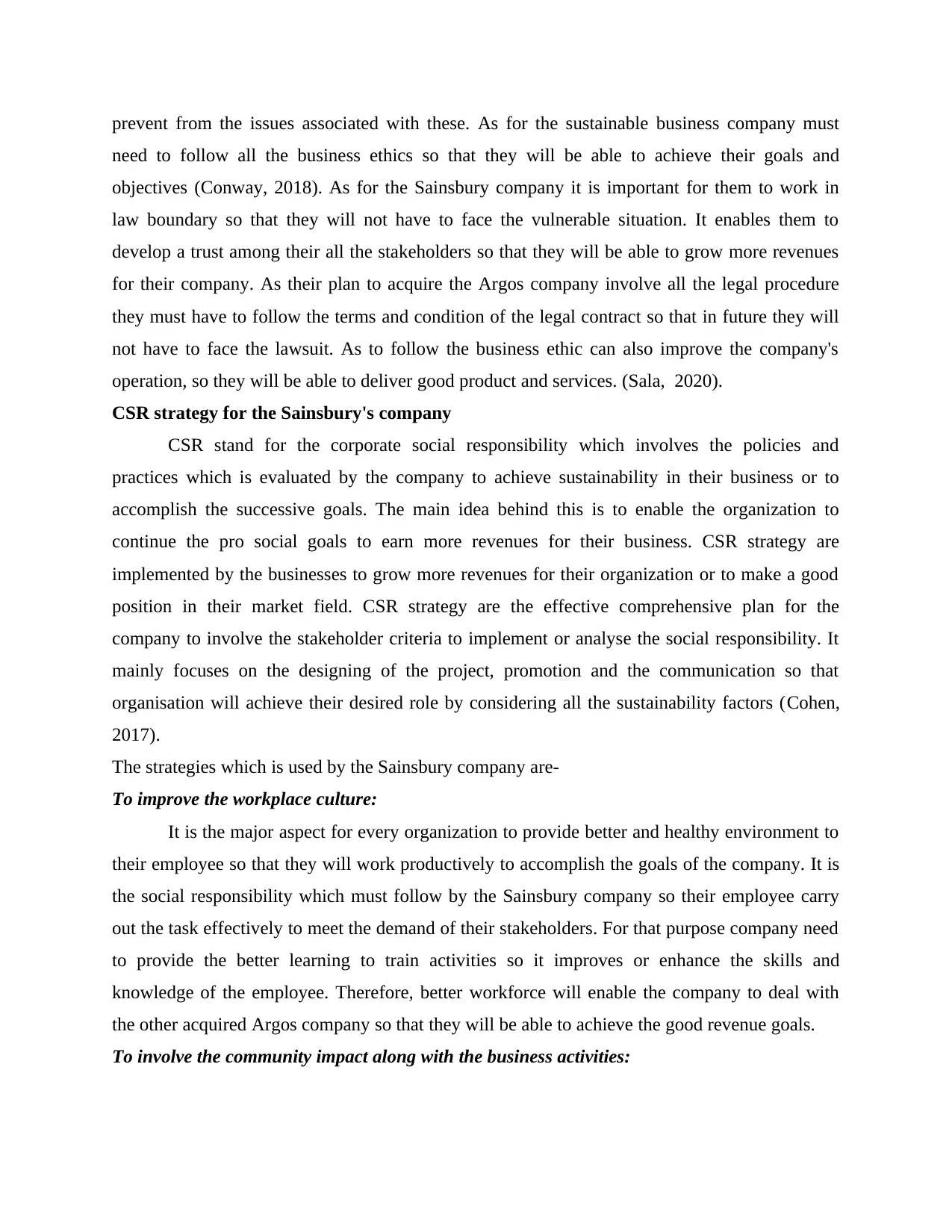
prevent from the issues associated with these. As for the sustainable business company must
need to follow all the business ethics so that they will be able to achieve their goals and
objectives (Conway, 2018). As for the Sainsbury company it is important for them to work in
law boundary so that they will not have to face the vulnerable situation. It enables them to
develop a trust among their all the stakeholders so that they will be able to grow more revenues
for their company. As their plan to acquire the Argos company involve all the legal procedure
they must have to follow the terms and condition of the legal contract so that in future they will
not have to face the lawsuit. As to follow the business ethic can also improve the company's
operation, so they will be able to deliver good product and services. (Sala, 2020).
CSR strategy for the Sainsbury's company
CSR stand for the corporate social responsibility which involves the policies and
practices which is evaluated by the company to achieve sustainability in their business or to
accomplish the successive goals. The main idea behind this is to enable the organization to
continue the pro social goals to earn more revenues for their business. CSR strategy are
implemented by the businesses to grow more revenues for their organization or to make a good
position in their market field. CSR strategy are the effective comprehensive plan for the
company to involve the stakeholder criteria to implement or analyse the social responsibility. It
mainly focuses on the designing of the project, promotion and the communication so that
organisation will achieve their desired role by considering all the sustainability factors (Cohen,
2017).
The strategies which is used by the Sainsbury company are-
To improve the workplace culture:
It is the major aspect for every organization to provide better and healthy environment to
their employee so that they will work productively to accomplish the goals of the company. It is
the social responsibility which must follow by the Sainsbury company so their employee carry
out the task effectively to meet the demand of their stakeholders. For that purpose company need
to provide the better learning to train activities so it improves or enhance the skills and
knowledge of the employee. Therefore, better workforce will enable the company to deal with
the other acquired Argos company so that they will be able to achieve the good revenue goals.
To involve the community impact along with the business activities:
need to follow all the business ethics so that they will be able to achieve their goals and
objectives (Conway, 2018). As for the Sainsbury company it is important for them to work in
law boundary so that they will not have to face the vulnerable situation. It enables them to
develop a trust among their all the stakeholders so that they will be able to grow more revenues
for their company. As their plan to acquire the Argos company involve all the legal procedure
they must have to follow the terms and condition of the legal contract so that in future they will
not have to face the lawsuit. As to follow the business ethic can also improve the company's
operation, so they will be able to deliver good product and services. (Sala, 2020).
CSR strategy for the Sainsbury's company
CSR stand for the corporate social responsibility which involves the policies and
practices which is evaluated by the company to achieve sustainability in their business or to
accomplish the successive goals. The main idea behind this is to enable the organization to
continue the pro social goals to earn more revenues for their business. CSR strategy are
implemented by the businesses to grow more revenues for their organization or to make a good
position in their market field. CSR strategy are the effective comprehensive plan for the
company to involve the stakeholder criteria to implement or analyse the social responsibility. It
mainly focuses on the designing of the project, promotion and the communication so that
organisation will achieve their desired role by considering all the sustainability factors (Cohen,
2017).
The strategies which is used by the Sainsbury company are-
To improve the workplace culture:
It is the major aspect for every organization to provide better and healthy environment to
their employee so that they will work productively to accomplish the goals of the company. It is
the social responsibility which must follow by the Sainsbury company so their employee carry
out the task effectively to meet the demand of their stakeholders. For that purpose company need
to provide the better learning to train activities so it improves or enhance the skills and
knowledge of the employee. Therefore, better workforce will enable the company to deal with
the other acquired Argos company so that they will be able to achieve the good revenue goals.
To involve the community impact along with the business activities:
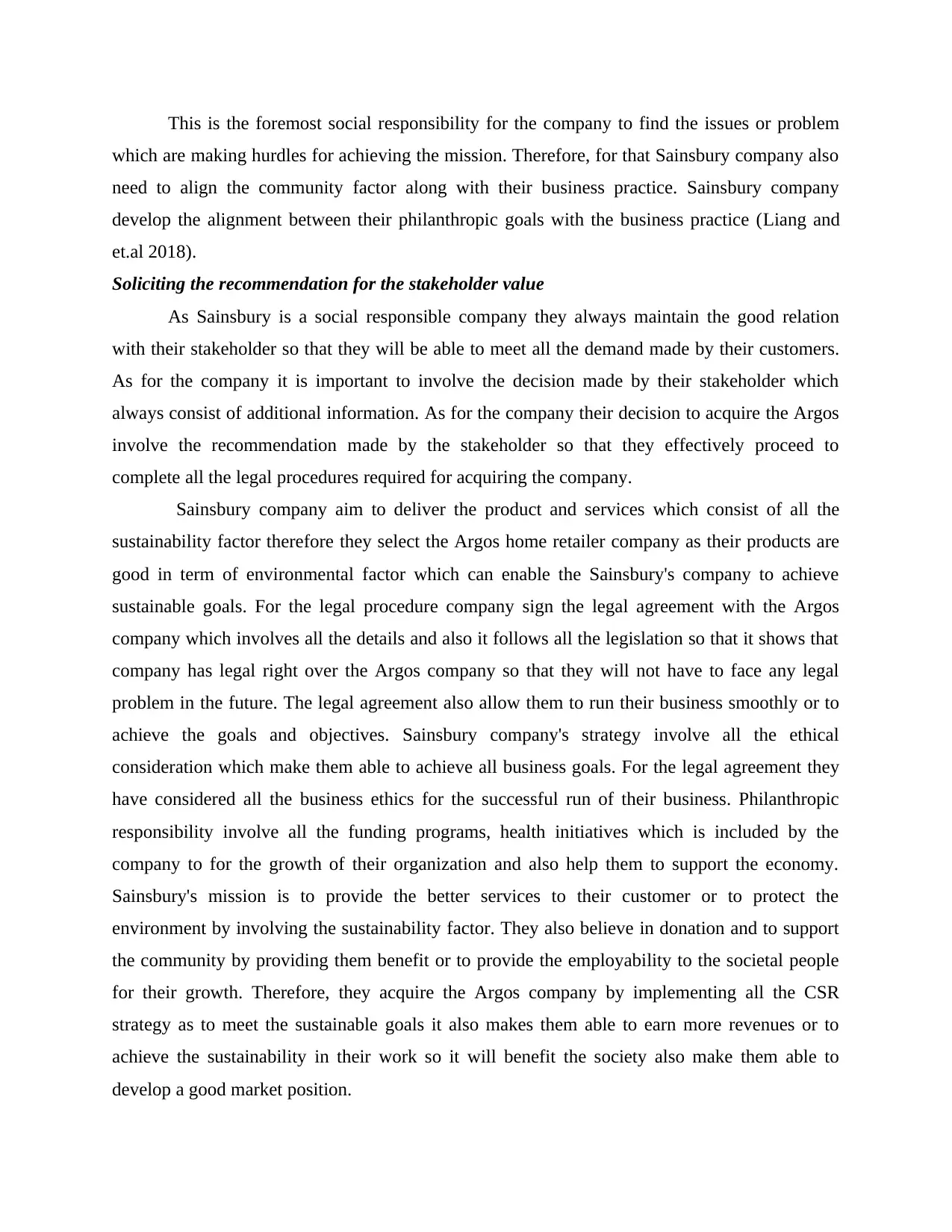
This is the foremost social responsibility for the company to find the issues or problem
which are making hurdles for achieving the mission. Therefore, for that Sainsbury company also
need to align the community factor along with their business practice. Sainsbury company
develop the alignment between their philanthropic goals with the business practice (Liang and
et.al 2018).
Soliciting the recommendation for the stakeholder value
As Sainsbury is a social responsible company they always maintain the good relation
with their stakeholder so that they will be able to meet all the demand made by their customers.
As for the company it is important to involve the decision made by their stakeholder which
always consist of additional information. As for the company their decision to acquire the Argos
involve the recommendation made by the stakeholder so that they effectively proceed to
complete all the legal procedures required for acquiring the company.
Sainsbury company aim to deliver the product and services which consist of all the
sustainability factor therefore they select the Argos home retailer company as their products are
good in term of environmental factor which can enable the Sainsbury's company to achieve
sustainable goals. For the legal procedure company sign the legal agreement with the Argos
company which involves all the details and also it follows all the legislation so that it shows that
company has legal right over the Argos company so that they will not have to face any legal
problem in the future. The legal agreement also allow them to run their business smoothly or to
achieve the goals and objectives. Sainsbury company's strategy involve all the ethical
consideration which make them able to achieve all business goals. For the legal agreement they
have considered all the business ethics for the successful run of their business. Philanthropic
responsibility involve all the funding programs, health initiatives which is included by the
company to for the growth of their organization and also help them to support the economy.
Sainsbury's mission is to provide the better services to their customer or to protect the
environment by involving the sustainability factor. They also believe in donation and to support
the community by providing them benefit or to provide the employability to the societal people
for their growth. Therefore, they acquire the Argos company by implementing all the CSR
strategy as to meet the sustainable goals it also makes them able to earn more revenues or to
achieve the sustainability in their work so it will benefit the society also make them able to
develop a good market position.
which are making hurdles for achieving the mission. Therefore, for that Sainsbury company also
need to align the community factor along with their business practice. Sainsbury company
develop the alignment between their philanthropic goals with the business practice (Liang and
et.al 2018).
Soliciting the recommendation for the stakeholder value
As Sainsbury is a social responsible company they always maintain the good relation
with their stakeholder so that they will be able to meet all the demand made by their customers.
As for the company it is important to involve the decision made by their stakeholder which
always consist of additional information. As for the company their decision to acquire the Argos
involve the recommendation made by the stakeholder so that they effectively proceed to
complete all the legal procedures required for acquiring the company.
Sainsbury company aim to deliver the product and services which consist of all the
sustainability factor therefore they select the Argos home retailer company as their products are
good in term of environmental factor which can enable the Sainsbury's company to achieve
sustainable goals. For the legal procedure company sign the legal agreement with the Argos
company which involves all the details and also it follows all the legislation so that it shows that
company has legal right over the Argos company so that they will not have to face any legal
problem in the future. The legal agreement also allow them to run their business smoothly or to
achieve the goals and objectives. Sainsbury company's strategy involve all the ethical
consideration which make them able to achieve all business goals. For the legal agreement they
have considered all the business ethics for the successful run of their business. Philanthropic
responsibility involve all the funding programs, health initiatives which is included by the
company to for the growth of their organization and also help them to support the economy.
Sainsbury's mission is to provide the better services to their customer or to protect the
environment by involving the sustainability factor. They also believe in donation and to support
the community by providing them benefit or to provide the employability to the societal people
for their growth. Therefore, they acquire the Argos company by implementing all the CSR
strategy as to meet the sustainable goals it also makes them able to earn more revenues or to
achieve the sustainability in their work so it will benefit the society also make them able to
develop a good market position.
⊘ This is a preview!⊘
Do you want full access?
Subscribe today to unlock all pages.

Trusted by 1+ million students worldwide
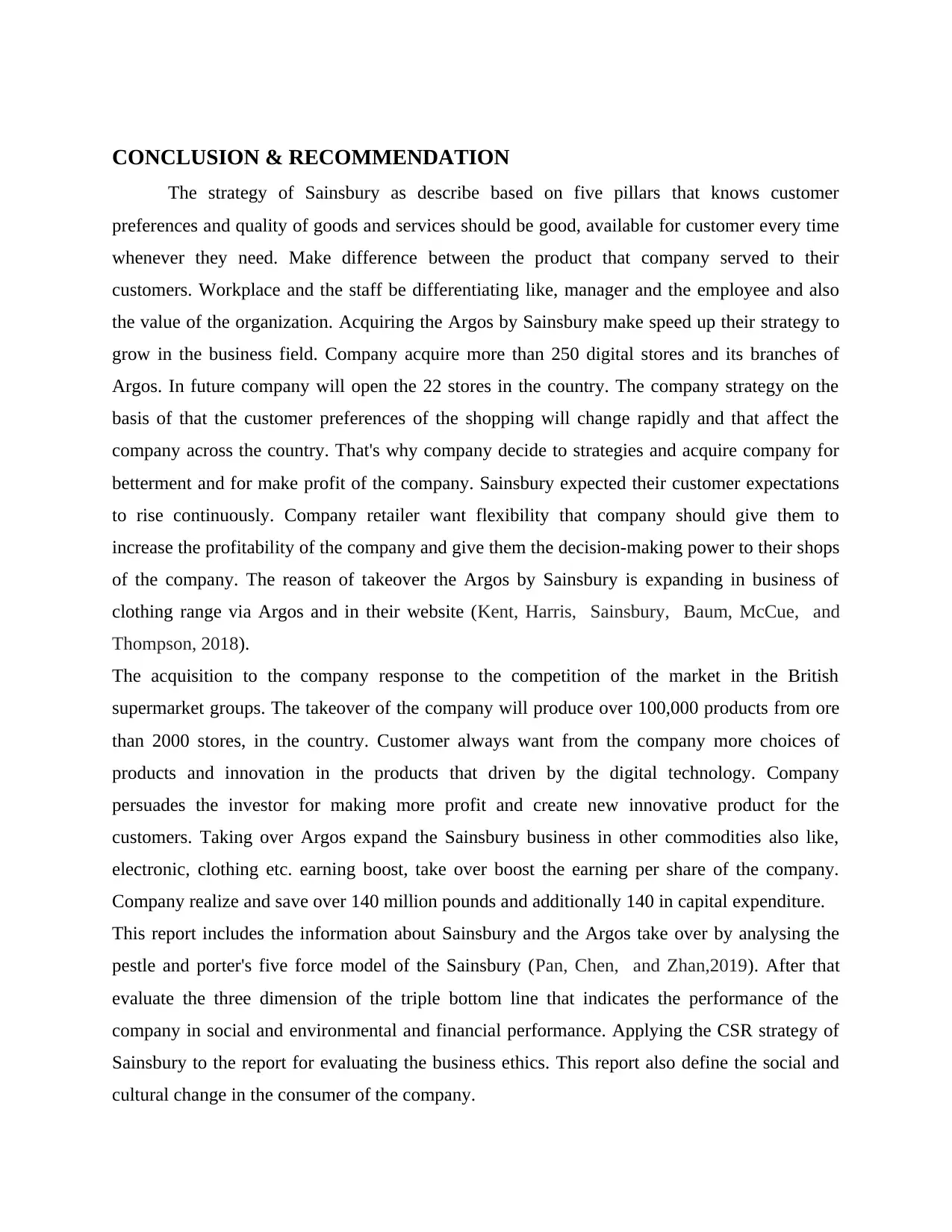
CONCLUSION & RECOMMENDATION
The strategy of Sainsbury as describe based on five pillars that knows customer
preferences and quality of goods and services should be good, available for customer every time
whenever they need. Make difference between the product that company served to their
customers. Workplace and the staff be differentiating like, manager and the employee and also
the value of the organization. Acquiring the Argos by Sainsbury make speed up their strategy to
grow in the business field. Company acquire more than 250 digital stores and its branches of
Argos. In future company will open the 22 stores in the country. The company strategy on the
basis of that the customer preferences of the shopping will change rapidly and that affect the
company across the country. That's why company decide to strategies and acquire company for
betterment and for make profit of the company. Sainsbury expected their customer expectations
to rise continuously. Company retailer want flexibility that company should give them to
increase the profitability of the company and give them the decision-making power to their shops
of the company. The reason of takeover the Argos by Sainsbury is expanding in business of
clothing range via Argos and in their website (Kent, Harris, Sainsbury, Baum, McCue, and
Thompson, 2018).
The acquisition to the company response to the competition of the market in the British
supermarket groups. The takeover of the company will produce over 100,000 products from ore
than 2000 stores, in the country. Customer always want from the company more choices of
products and innovation in the products that driven by the digital technology. Company
persuades the investor for making more profit and create new innovative product for the
customers. Taking over Argos expand the Sainsbury business in other commodities also like,
electronic, clothing etc. earning boost, take over boost the earning per share of the company.
Company realize and save over 140 million pounds and additionally 140 in capital expenditure.
This report includes the information about Sainsbury and the Argos take over by analysing the
pestle and porter's five force model of the Sainsbury (Pan, Chen, and Zhan,2019). After that
evaluate the three dimension of the triple bottom line that indicates the performance of the
company in social and environmental and financial performance. Applying the CSR strategy of
Sainsbury to the report for evaluating the business ethics. This report also define the social and
cultural change in the consumer of the company.
The strategy of Sainsbury as describe based on five pillars that knows customer
preferences and quality of goods and services should be good, available for customer every time
whenever they need. Make difference between the product that company served to their
customers. Workplace and the staff be differentiating like, manager and the employee and also
the value of the organization. Acquiring the Argos by Sainsbury make speed up their strategy to
grow in the business field. Company acquire more than 250 digital stores and its branches of
Argos. In future company will open the 22 stores in the country. The company strategy on the
basis of that the customer preferences of the shopping will change rapidly and that affect the
company across the country. That's why company decide to strategies and acquire company for
betterment and for make profit of the company. Sainsbury expected their customer expectations
to rise continuously. Company retailer want flexibility that company should give them to
increase the profitability of the company and give them the decision-making power to their shops
of the company. The reason of takeover the Argos by Sainsbury is expanding in business of
clothing range via Argos and in their website (Kent, Harris, Sainsbury, Baum, McCue, and
Thompson, 2018).
The acquisition to the company response to the competition of the market in the British
supermarket groups. The takeover of the company will produce over 100,000 products from ore
than 2000 stores, in the country. Customer always want from the company more choices of
products and innovation in the products that driven by the digital technology. Company
persuades the investor for making more profit and create new innovative product for the
customers. Taking over Argos expand the Sainsbury business in other commodities also like,
electronic, clothing etc. earning boost, take over boost the earning per share of the company.
Company realize and save over 140 million pounds and additionally 140 in capital expenditure.
This report includes the information about Sainsbury and the Argos take over by analysing the
pestle and porter's five force model of the Sainsbury (Pan, Chen, and Zhan,2019). After that
evaluate the three dimension of the triple bottom line that indicates the performance of the
company in social and environmental and financial performance. Applying the CSR strategy of
Sainsbury to the report for evaluating the business ethics. This report also define the social and
cultural change in the consumer of the company.
Paraphrase This Document
Need a fresh take? Get an instant paraphrase of this document with our AI Paraphraser

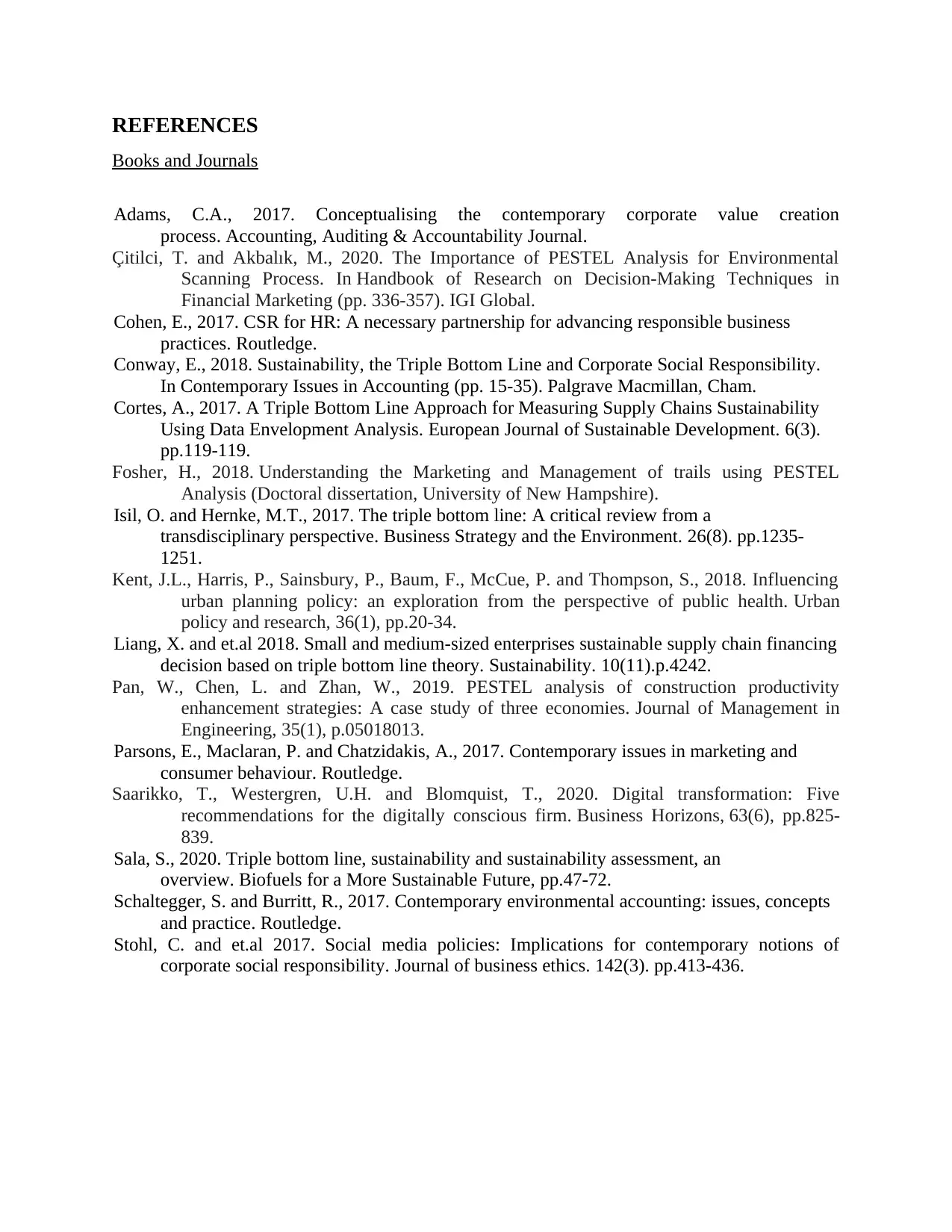
REFERENCES
Books and Journals
Adams, C.A., 2017. Conceptualising the contemporary corporate value creation
process. Accounting, Auditing & Accountability Journal.
Çitilci, T. and Akbalık, M., 2020. The Importance of PESTEL Analysis for Environmental
Scanning Process. In Handbook of Research on Decision-Making Techniques in
Financial Marketing (pp. 336-357). IGI Global.
Cohen, E., 2017. CSR for HR: A necessary partnership for advancing responsible business
practices. Routledge.
Conway, E., 2018. Sustainability, the Triple Bottom Line and Corporate Social Responsibility.
In Contemporary Issues in Accounting (pp. 15-35). Palgrave Macmillan, Cham.
Cortes, A., 2017. A Triple Bottom Line Approach for Measuring Supply Chains Sustainability
Using Data Envelopment Analysis. European Journal of Sustainable Development. 6(3).
pp.119-119.
Fosher, H., 2018. Understanding the Marketing and Management of trails using PESTEL
Analysis (Doctoral dissertation, University of New Hampshire).
Isil, O. and Hernke, M.T., 2017. The triple bottom line: A critical review from a
transdisciplinary perspective. Business Strategy and the Environment. 26(8). pp.1235-
1251.
Kent, J.L., Harris, P., Sainsbury, P., Baum, F., McCue, P. and Thompson, S., 2018. Influencing
urban planning policy: an exploration from the perspective of public health. Urban
policy and research, 36(1), pp.20-34.
Liang, X. and et.al 2018. Small and medium-sized enterprises sustainable supply chain financing
decision based on triple bottom line theory. Sustainability. 10(11).p.4242.
Pan, W., Chen, L. and Zhan, W., 2019. PESTEL analysis of construction productivity
enhancement strategies: A case study of three economies. Journal of Management in
Engineering, 35(1), p.05018013.
Parsons, E., Maclaran, P. and Chatzidakis, A., 2017. Contemporary issues in marketing and
consumer behaviour. Routledge.
Saarikko, T., Westergren, U.H. and Blomquist, T., 2020. Digital transformation: Five
recommendations for the digitally conscious firm. Business Horizons, 63(6), pp.825-
839.
Sala, S., 2020. Triple bottom line, sustainability and sustainability assessment, an
overview. Biofuels for a More Sustainable Future, pp.47-72.
Schaltegger, S. and Burritt, R., 2017. Contemporary environmental accounting: issues, concepts
and practice. Routledge.
Stohl, C. and et.al 2017. Social media policies: Implications for contemporary notions of
corporate social responsibility. Journal of business ethics. 142(3). pp.413-436.
Books and Journals
Adams, C.A., 2017. Conceptualising the contemporary corporate value creation
process. Accounting, Auditing & Accountability Journal.
Çitilci, T. and Akbalık, M., 2020. The Importance of PESTEL Analysis for Environmental
Scanning Process. In Handbook of Research on Decision-Making Techniques in
Financial Marketing (pp. 336-357). IGI Global.
Cohen, E., 2017. CSR for HR: A necessary partnership for advancing responsible business
practices. Routledge.
Conway, E., 2018. Sustainability, the Triple Bottom Line and Corporate Social Responsibility.
In Contemporary Issues in Accounting (pp. 15-35). Palgrave Macmillan, Cham.
Cortes, A., 2017. A Triple Bottom Line Approach for Measuring Supply Chains Sustainability
Using Data Envelopment Analysis. European Journal of Sustainable Development. 6(3).
pp.119-119.
Fosher, H., 2018. Understanding the Marketing and Management of trails using PESTEL
Analysis (Doctoral dissertation, University of New Hampshire).
Isil, O. and Hernke, M.T., 2017. The triple bottom line: A critical review from a
transdisciplinary perspective. Business Strategy and the Environment. 26(8). pp.1235-
1251.
Kent, J.L., Harris, P., Sainsbury, P., Baum, F., McCue, P. and Thompson, S., 2018. Influencing
urban planning policy: an exploration from the perspective of public health. Urban
policy and research, 36(1), pp.20-34.
Liang, X. and et.al 2018. Small and medium-sized enterprises sustainable supply chain financing
decision based on triple bottom line theory. Sustainability. 10(11).p.4242.
Pan, W., Chen, L. and Zhan, W., 2019. PESTEL analysis of construction productivity
enhancement strategies: A case study of three economies. Journal of Management in
Engineering, 35(1), p.05018013.
Parsons, E., Maclaran, P. and Chatzidakis, A., 2017. Contemporary issues in marketing and
consumer behaviour. Routledge.
Saarikko, T., Westergren, U.H. and Blomquist, T., 2020. Digital transformation: Five
recommendations for the digitally conscious firm. Business Horizons, 63(6), pp.825-
839.
Sala, S., 2020. Triple bottom line, sustainability and sustainability assessment, an
overview. Biofuels for a More Sustainable Future, pp.47-72.
Schaltegger, S. and Burritt, R., 2017. Contemporary environmental accounting: issues, concepts
and practice. Routledge.
Stohl, C. and et.al 2017. Social media policies: Implications for contemporary notions of
corporate social responsibility. Journal of business ethics. 142(3). pp.413-436.
⊘ This is a preview!⊘
Do you want full access?
Subscribe today to unlock all pages.

Trusted by 1+ million students worldwide
1 out of 12
Related Documents
Your All-in-One AI-Powered Toolkit for Academic Success.
+13062052269
info@desklib.com
Available 24*7 on WhatsApp / Email
![[object Object]](/_next/static/media/star-bottom.7253800d.svg)
Unlock your academic potential
Copyright © 2020–2026 A2Z Services. All Rights Reserved. Developed and managed by ZUCOL.





